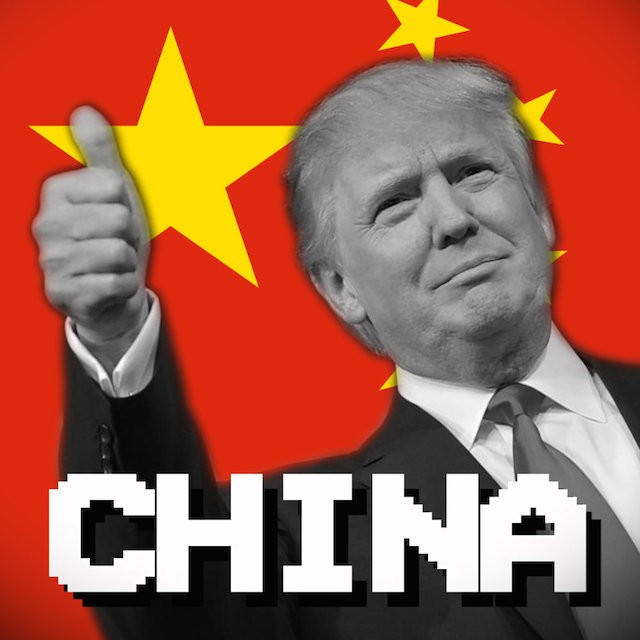Donald Trump does like talking about China. But what are the Chinese saying about him?
特朗普確實(shí)愛談?wù)撝袊5侵袊嗽趺纯创兀?/div>
We sent Seth Doane to find out.
我們派了記者賽斯·多恩去一探究竟。
“China, taking our jobs, taking our money."
“中國,搶走我們的工作,拿走我們的錢。”
Donald Trump takes aim at China...
特朗普不斷炮轟中國......
“China just devalued their currency.”
“中國剛剛貶值了他們的貨幣。”
...a lot.
......炮聲連連。
"China."
“中國。”

"Do you know this person?"
“你認(rèn)識(shí)這個(gè)人嗎?”
But nearly 7,000 miles away, we took Trump's picture into the "Hutongs,"
但是我們把特朗普的照片帶到了近7000英里外的胡同,
"No, no, no." "Don't know him?"
“不認(rèn)識(shí),不認(rèn)識(shí)。”“不認(rèn)識(shí)他?”
...narrow alleyways in the heart of Beijing.
......這些在北京中心地帶的窄巷。
“What do you think?”
“你認(rèn)為是誰?”
Most here had never heard of him.
這里大多數(shù)的人從來沒有聽說過他。
"Bu zhi dao, she is saying bu zhi dao, I don't know."
“不知道,她說不知道,我不認(rèn)識(shí)。”
"Jeb Bush?"
“是杰布·布什嗎?”
“No, this is not Jeb Bush. How about another guess?”
“不,這不是杰布·布什。再猜一次?”
"Eh...Joe Biden?"
“額,喬·拜登嗎?”
When we explained some of Trump's criticism to this finance student Simon Xu, he thought some of it might actually be a backhanded compliment.
當(dāng)我們向這位金融學(xué)生徐先生解釋了一些特朗普的批評(píng)言論,他認(rèn)為其中的一些有可能是諷刺挖苦下的恭維。
"Before we are not that good and people just ignored us, now we are rising up and I kind of proud that people are actually hearing us and see us as competitors."
“中國以前沒有那么好,人家忽略中國,現(xiàn)在我們正崛起,我有點(diǎn)自豪,大家實(shí)際上開始了解中國并把我們看做對(duì)手。”
We tried for an official reaction at the Ministry of Foreign Affairs.
我們嘗試去外交部聽聽官方的回應(yīng)。
"How does China's government view this?"
“中國政府如何看待這件事?”
"We understand that in the United States people enjoy the right to make all kinds of remarks.
“我們理解,在美國每個(gè)人都有權(quán)力發(fā)表個(gè)人觀點(diǎn)。
But what's important to us is the policies adopted by the U.S. government."
但我們更看重的是美國采取的對(duì)華態(tài)度。”
China's government-backed Global Times wasn't so diplomatic.
中國國營的《環(huán)球時(shí)報(bào)》則沒有如此外交范兒。
"The Chinese people find it bizarre that serious presidential elections have become a slideshow for candidates of questionable quality."
“中國人覺得奇怪的是,嚴(yán)肅的總統(tǒng)選舉,已經(jīng)變成資質(zhì)存在疑問的候選人的小插曲。”
“I don't wear toupee, it's my hair.”
“我不戴假發(fā),這是我自己的頭發(fā)。”
"His hair, it defies gravity."
“他的頭發(fā),違背了地心引力定律。”
Stand-up comedian Evan Zhou told us he sees plenty of opportunities with Trump, even in a country where comedians don't stray far from government approved speech.
單口相聲演員周先生告訴我們,在特朗普身上他看到了大量的機(jī)會(huì),即使在中國這樣一個(gè)喜劇演員也不常偏離政府批準(zhǔn)的講話的地方。
"This is the first time maybe we can keep in line with the government."
“這可能是第一次我們能和政府保持高度一致。”
“Making fun of Donald Trump?""Yeah."
“嘲笑特朗普嗎?”“是的。”
"In Chinese we call it Chuanpu."
“中國話我們叫他川普。”
Most here simply see it for what it is: a campaign for votes.
這里大部分人只是看出了它的本質(zhì):一場(chǎng)拉選票的競(jìng)選。
Seth Doane CBS news Beijing.
賽斯·多恩,CBS新聞,北京報(bào)道。


